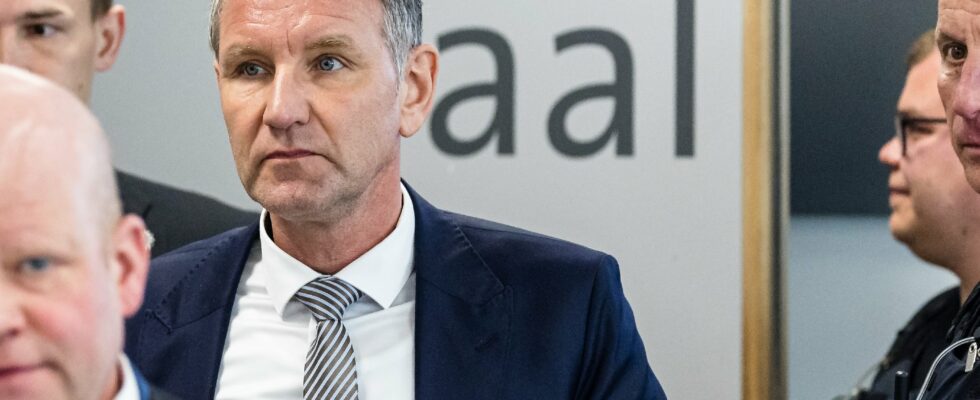More than three million people took to the streets earlier this year to protest against the far right. And just days before regional elections in East Germany, churches, businesses, unions and NGOs have reiterated their calls not to vote for the AfD (Alternative für Deutschland), which is close to neo-Nazi circles. Nothing is working.
The party, founded in 2013 by a few Eurosceptic university professors, has continued to rise in the polls, nibbling away at the votes of traditional parties election after election. “We have been discussing for 10 years how to stop the rise of the extreme right. But with each election, the AfD improves its score,” notes Hendrik Träger, a political scientist at the University of Leipzig.
Convicted by the courts for repeating Nazi slogans
After the attack in Solingen, committed last week by a 26-year-old Syrian refugee who was due to be deported to Bulgaria, the AfD has never felt stronger in its anti-migrant narrative on the eve of two crucial regional elections this Sunday, September 1 in Saxony and Thuringia. Two bastions of the extreme right in the former East Germany (GDR).
The parliamentary immunity of Björn Höcke, the ideological leader and head of the Thuringian federation of the AfD, the most radical in Germany, has been lifted eight times. He was convicted by the courts for using Nazi slogans in his speeches. “But voters couldn’t care less,” says Hendrik Träger.
“The political content of the AfD has not changed. On the other hand, the party has become more professional by favouring social networks over professional media to communicate,” he continues. “The AfD will triumph despite being under surveillance by the general intelligence services! This election will have devastating consequences,” he says.
Government coalition parties under threat
No one dares to imagine what the political landscape will look like next week in Germany. In a panic, the Scholz government has tightened its migration policy this week, notably by resuming on Friday, August 30, the deportation of criminals to Afghanistan for the first time since the return of the Taliban to Kabul. A hasty and feverish decision in the face of the rise of the extreme right.
The eyes of the entire political world will be fixed on Sunday’s results. “The East has always been a political laboratory due to high electoral volatility,” continues the political scientist. With more than 30% of the vote, according to the latest polls, the AfD could even obtain a blocking minority in Thuringia this time (one third of the vote). A score that risks blocking the political game in these regions given that no party wants to form a coalition with a leadership that does not hide its sympathy for neo-Nazis.
The conservatives are the last political force capable of standing up to the extreme right in the eastern regions. The Greens, the liberals (FDP) and also the Chancellor’s party (SPD) are unable to muster enough votes to block it. The three parties in power in Berlin, whose unpopularity has reached historic highs, are even at risk of not reaching the fateful 5% threshold needed to sit in the parliaments in Germany. “Structurally, the conservatives are the only ones who can still conduct election campaigns in these regions,” notes Hendrik Träger.
As for the radical left (Die Linke), which still governs Thuringia, it has been completely vampirized by the defector Sahra Wagenknecht who created only eight months ago the “alliance” that bears her name (BSW). The situation at the exit of the polls will be so complicated that the conservatives no longer exclude an alliance with this former Stalinist who poses as a condition the cessation of arms deliveries to Ukraine and advocates the exit from NATO. The president of the conservatives (CDU), Friedrich Merz, has not ruled out an alliance at the regional level! In France, this would mean a rapprochement between LR and LFI for the formation of a government…
Unlike Eric Ciotti, Friedrich Merz refuses to break the cordon sanitaire. Which does not prevent the “anti-Merkel” from treading on the AfD’s toes by adopting a more populist tone and demanding a radical change in migration policy one year before the legislative elections that could lead him to the chancellery. “Enough!” he said after the Solingen attack, his lieutenants calling for the “closing of the borders” [allemandes] “For illegal immigration.” “Anyone who welcomes half of Calcutta is not helping Calcutta. He is becoming Calcutta,” said former Health Minister Jens Spahn, vice-president of the parliamentary group, anticipating the tone of the 2025 legislative campaign.
